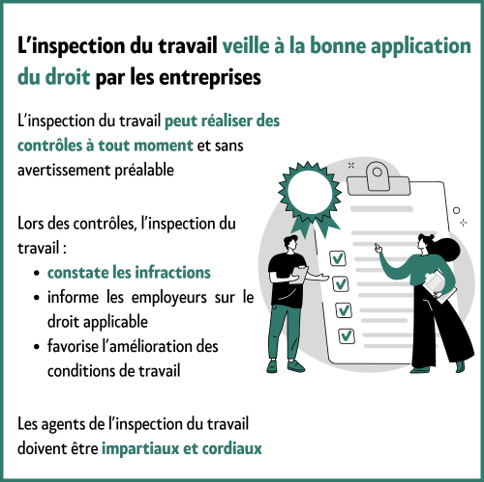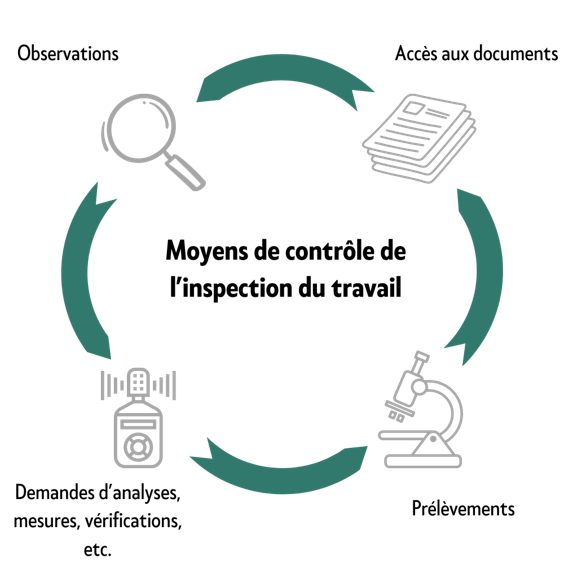Inspection visits by the labor inspectorate are a frequent occurrence, and are particularly important for ensuring compliance with regulations, and for the health and safety of workers. In this article, you'll discover the main issues involved in a visit by the labor inspectorate.
What is the role of the labor inspectorate?
The Labor Inspectorate is a government body responsible for ensuring that labor law is properly applied by companies, as well as collective agreements(Article L8112-1 C.Trav.).
- As part of its missions and controls, the labor inspectorate ensures compliance with the principles of occupational risk prevention, and contributes to improving working conditions and labor relations within the company(Article R8112-1 C.Trav.).
The role of the Labour Inspectorate is primarily to record breaches of the French Labor Code's provisions on health, safety and working conditions (HSS). But it is also responsible for noting certain breaches of other Codes, in particular(Article L8112-2 C.Trav.):
- offenses relating to discrimination, moral or sexual harassment, human trafficking, working and housing conditions, etc. (French Penal Code);
- ban on smoking in the workplace (Public Health Code);
- entry and residence conditions for foreigners in France (Code de l'entrée et du séjour des étrangers et du droit d'asile);
- declarations of industrial accidents (Social Security Code) ;
- illegal employment (Article L8211-1 C.Trav.).
ℹ Please note : The labor inspectorate reports to the regional directorate for business, competition, consumer affairs, labor and employment (DREETS), and participates in the execution of its missions.
***
Finally, the labor inspectorate plays an important role in advising and conciliating companies.
On the one hand, in the event of internal conflict within the company, the labor inspectorate can act as mediator between employees and the employer(Article R8112-2 C.Trav.).
On the other hand, it must provide advice and information to users on the applicable law , and respond to requests for information within a reasonable time(Article R8124-20 C.Trav.).
Labour inspection ethics
Labour inspection visits can sometimes be a source of tension with employers. While it is in the employer's interest to adopt a calm and cooperative attitude, inspectors are bound by a code of ethics.
ℹ Please note : The rights and duties of the labor inspectorate are also defined by Conventions no. 81 and no. 129 of the International Labor Organization (ILO) (Article L8124-1 C.Trav.).
Labour inspectors must therefore :
- be impartial and show no bias in their behavior, words or actions(Article R8124-18 C.Trav.);
- equal treatment for users in identical situations(Article R8124-18 C.Trav.);
- have no direct or indirect interest whatsoever in the companies they control(Article R8124-14 C.Trav.);
- remain courteous in all circumstances (Article R8124-26 C.Trav.) and refrain from any expression or manifestation of personal beliefs(Article R8124-19 C.Trav.).
🔎 Focus : Labor inspection officers are bound by professional secrecy in particular with regard to manufacturing and operating procedures they may come across during their missions (Article L8113-10 C.Trav.).
What are the procedures for an inspection visit by the labor inspectorate?
Labour inspectors may carry out inspections at any time of the day or night, without prior warning(Article R8124-25 C.Trav.). They are nevertheless required to carry their professional card to justify their status.
All companies or premises where work is carried out may be subject to inspection(Article L8113-1 C.Trav.).
The inspection officer may decide not to notify the employer of his presence if he considers that this would hinder the effectiveness of the inspection.
Members of the staff delegation on the social and economic committee (CSE) are informed of the inspector's presence by the employer, and may present their observations. The inspector may be accompanied by a member of the CSE staff delegation, if the latter so wishes.
In addition, inspectors are entitled to ask employers and employees to provide proof of their identity and address(Article L8113-2 C.Trav.).

How does an inspection visit by the labor inspectorate work?
When a company is inspected by the labor inspectorate, it is possible to check that all regulatory provisions applicable to the company are being applied.
Depending on the company's activity, the inspection officer will focus on certain provisions of the Labor Code to check compliance.
What checks are carried out by the labor inspectorate?
On the one hand, in terms of occupational health and safety (OHS), the inspection officer can check compliance with general risk prevention principles and obligations(Article L4721-1 C.Trav.).
More specifically, the inspection may cover(Article R4721-1 C.Trav.) :
- work organization conditions;
- workstation design ;
- condition of traffic surfaces;
- the cleanliness and orderliness of the workplace;
- storage of materials and manufacturing products;
- compulsory displays in the company(Article D4711-1 C.Trav.) ;
- compliance with the regulations applicable to young workers(Article L4733-2 C.Trav.);
- ...
👉 For more information, please consult our article dedicated to compulsory displays in the workplace !
Still on the subject of OHS, the inspector can also ask the employer to carry out technical inspections to verify(Article L4722-1 C.Trav.) :
- the state of conformity of installations and work equipment;
- exposure of workers to physical nuisances and to physical, chemical or biological agents subject to exposure limits;
- the absence of hazardous physical, chemical or biological emissions.
- ...
***
In addition, as part of the fight against illegal employment, the labor inspectorate verifies the absence of the following offenses(Article L8211-1 C.Trav.) :
- undeclared work;
- haggling ;
- illicit lending of labour ;
- employment of foreigners not authorized to work ;
- irregular multiple jobholding;
- fraud or misrepresentation.
- ...
How is regulatory compliance verified in practice?
Firstly, labour inspectors can carry out some of their checks simply by observing the company and its premises.
Secondly, they have access to all mandatory documents, books and registers relating to the employment system(Article L8113-4 C.trav.).
Here are the main registers and documents that employers must keep available for the Labour Inspectorate(Article L8113-4 C.Trav.):
● all documents relating to checks and inspections(Article D4711-2 C.Trav.) ;
● the document unique d'évaluation des risques professionnels (DUERP) (Article R4121-1 C.Trav.) ;
● the public health and environmental alert register(Article D4133-1 C.Trav.) ;
● the register of serious and imminent dangers(Article D4132-1 C.Trav.) ;
● the register of electrical installation inspections(Article R4226-19 C.Trav.);
● the fire safety register(Article R4227-39 C.Trav.) ;
● the register of minor accidents(Article L441-4 C.Trav.) ;
● the register of periodic inspections of work equipment (Article R4323-25 C.Trav.) ;
● etc.
🔎 Focus : As part of the fight against illegal employment, inspectors also have access to company accounting documents (Article L8113-5-1 C.Trav.), as well as to documents used to record the working hours of each employee (Article L3171-3 C.Trav.).
Thirdly, they may take samples of products and materials used or distributed by the company(Article L8113-3 C.Trav.).
These samples must be taken in accordance with the provisions of the French Consumer Code (authorized agent, drafting of official report, sealing, etc.).
Fourthly, with regard to OHS, labor inspectors can ask employers to carry out technical checks or inspections, and in particular(Article L4722-1 C.Trav.) :
- measures for ventilation and sanitation of work premises(Article R4722-1 C.Trav.) ;
- photometric surveys to measure workplace lighting(Article R4722-3 C.Trav.);
- checking work equipment(Article R4722-5 C.Trav.);
- control of exposure limit values to chemical agents(Article R4722-12 C.Trav.);
- control of asbestos fiber dust levels(Article R4722-14 C.Trav.) ;
- measurements of workers' exposure to noise(Article R4722-16 C.Trav.) ;
- measurements of workers' exposure to mechanical vibrations(Article R4722-18 C.Trav.);
- measurements of workers' exposure to ionizing radiation(Article R4722-20 C.Trav.);
- checking the conformity of electrical installations(Article R4722-26 C.Trav.) ;
- analysis of materials, substances, mixtures, equipment, materials or articles likely to contain or emit hazardous physical, chemical or biological agents(Article R4722-29 C.Trav.).

What is the procedure in the event of an infringement?
The Labour Inspectorate's inspection officer will draw up an official report of the offence, which will be valid until proven otherwise (Article L8113-7 C.Trav.). These reports are forwarded to the public prosecutor.
In OHS matters, before drawing up an official report, the inspector gives the employer formal notice to comply with regulations (Article L4721-4 C.Trav.).
⚠️ Attention : When the inspector observes a serious or imminent danger to the physical integrity of workers, he can immediately draw up a report without prior formal notice (Article L4721-5 C.Trav.).
Formal notices must indicate the infringements observed and set a deadline by which these infringements must have disappeared(Article L4721-6 C.Trav.). This period may not be less than four days. In this table, you will find the deadlines laid down according to the infringements committed by the employer(Article R4721-5 C.Trav.).
They are notified in writing to the employer, either by hand-delivery or by registered letter(Article R8113-4 C.Trav.).
🔎 Focus : DREETS can also serve formal notice on employers when the offences committed concern non-compliance with the general principles of prevention or an infringement of the general health and safety obligation (Article L4721-1 C.Trav.).
However, the employer may contest the formal notice either before the Ministry of Labor or the DREETS, depending on who issued the notice(Article L4723-1 C.Trav.).
***
In addition to issuing penalty notices and formal notices, the labor inspector can apply emergency measures in the event of serious risk.
With this in mind, he may refer the matter to the judicial judge for the latter to take the necessary measures to put an end to the risk (decommissioning, immobilization, seizure, etc.)(Article L4732-1 C.Trav.).
Finally, as an emergency measure against a serious and imminent danger, the inspector can prescribe the temporary stoppage of work or an activity when he finds(Article L4731-1 C.Trav.) :
- lack of protection against falls from height;
- the absence of devices to protect against the risk of burial ;
- the absence of protective devices to avoid the risks associated with asbestos removal or encapsulation work;
- the use of work equipment lacking suitable protection;
- a risk in the vicinity of overhead or underground power lines;
- risk of direct electrical contact with bare, live parts.

What are the penalties for breaching the Labor Code?
Violations of the Labor Code are punishable by fines for the employer.
⚠️ Warning : Obstructing the work and control of the labor inspector is punishable by one year's imprisonment and a fine of 37,500 euros (Article L8114-1 C.Trav.).
With regard to OHS, in general terms, failure to provide work equipment or to ensure its conformity, as well as any failure to prevent risks of exposure, render the employer liable to a fine of 10,000 euros(Article L4741-1 C.Trav.).
In the event of an inspection, the employer is liable to a fine of 10,000 euros for non-compliance:
- the temporary cessation of activity prescribed by the inspection officer(Article L4752-1 C.Trav.);
- a request for verification, measurement or analysis from the labor inspector(Article L4752-2 C.Trav.).
Similarly, in the event of an inspection, employers are liable to a fine of 3,750 euros if they fail to comply:
- to formal notices from the DREETS(Article L4741-3 C.Trav.) ;
- measures relating to the temporary cessation of activity prescribed by the inspection officer(Article L4741-3-1 C.Trav.). The penalty is one year's imprisonment.
In addition, failure to comply with compulsory company signage is punishable by a4th class fine of 750 euros(Article R4741-3 C.Trav.).
Finally, the employer is also liable to a 5th class fine of 1,500 euros for :
- Failure to update risk assessment(Article R4741-1 C.Trav.) ;
- Defects and omissions on the worker exposure monitoring sheet(Article R4741-1-1 C.Trav.) ;
- absence of mandatory OHS registers(Article R8114-2 C.Trav.).
To remember:
❖ The labor inspectorate verifies compliance with the regulations applicable to the company;
❖ It is not required to give prior notice to the employer in the event of an inspection ;
❖ The labor inspectorate also plays an advisory and conciliation role for companies;
❖ Employers may be subject to criminal penalties if they are found to be in breach of the law during an inspection by the labor inspectorate.


.svg)



